Issues and Challenges of Environmental Accounting and its Impact on Organizational Performance
VerifiedAdded on 2023/01/10
|10
|2600
|54
AI Summary
This document discusses the issues and challenges faced by environmental accounting and their impact on organizational performance. It includes a case study on Rolls Royce and explores strategies to address these challenges. The research aims to investigate the notion of environmental accounting, analyze its influence on organizational performance, and identify strategies to boost performance.
Contribute Materials
Your contribution can guide someone’s learning journey. Share your
documents today.

Business management
Secure Best Marks with AI Grader
Need help grading? Try our AI Grader for instant feedback on your assignments.
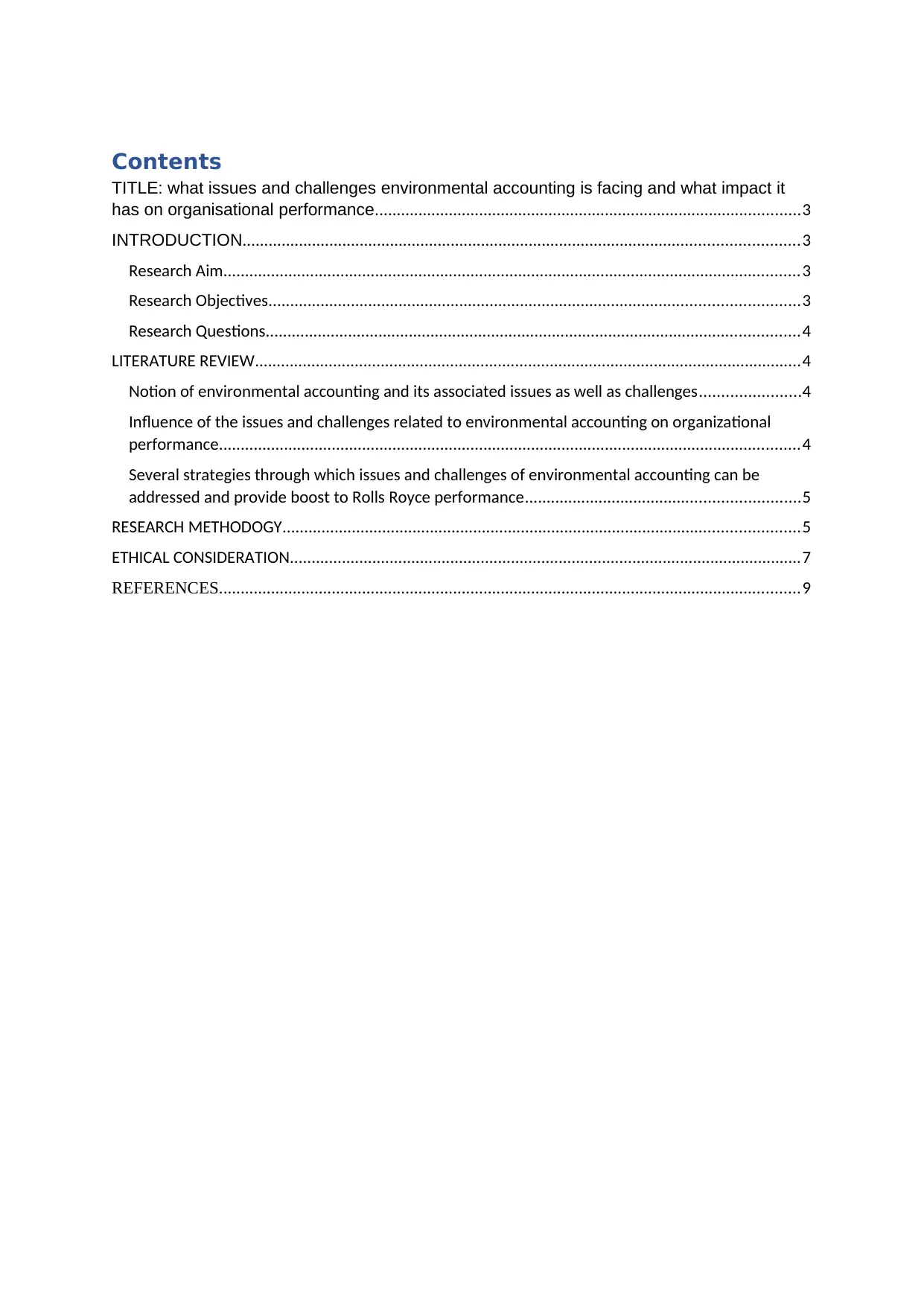
Contents
TITLE: what issues and challenges environmental accounting is facing and what impact it
has on organisational performance..................................................................................................3
INTRODUCTION................................................................................................................................3
Research Aim.....................................................................................................................................3
Research Objectives..........................................................................................................................3
Research Questions...........................................................................................................................4
LITERATURE REVIEW..............................................................................................................................4
Notion of environmental accounting and its associated issues as well as challenges.......................4
Influence of the issues and challenges related to environmental accounting on organizational
performance......................................................................................................................................4
Several strategies through which issues and challenges of environmental accounting can be
addressed and provide boost to Rolls Royce performance...............................................................5
RESEARCH METHODOGY.......................................................................................................................5
ETHICAL CONSIDERATION......................................................................................................................7
REFERENCES......................................................................................................................................9
TITLE: what issues and challenges environmental accounting is facing and what impact it
has on organisational performance..................................................................................................3
INTRODUCTION................................................................................................................................3
Research Aim.....................................................................................................................................3
Research Objectives..........................................................................................................................3
Research Questions...........................................................................................................................4
LITERATURE REVIEW..............................................................................................................................4
Notion of environmental accounting and its associated issues as well as challenges.......................4
Influence of the issues and challenges related to environmental accounting on organizational
performance......................................................................................................................................4
Several strategies through which issues and challenges of environmental accounting can be
addressed and provide boost to Rolls Royce performance...............................................................5
RESEARCH METHODOGY.......................................................................................................................5
ETHICAL CONSIDERATION......................................................................................................................7
REFERENCES......................................................................................................................................9
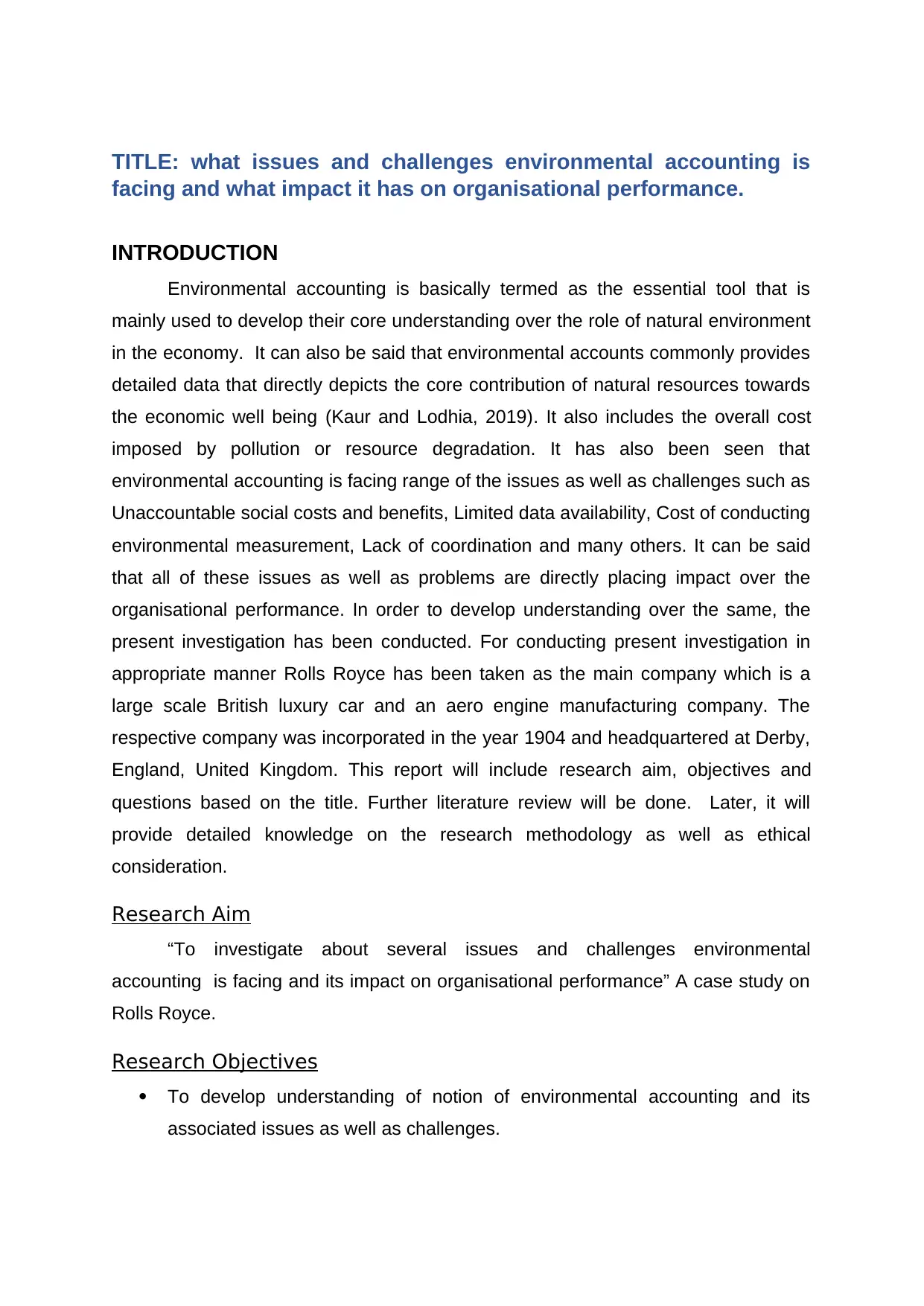
TITLE: what issues and challenges environmental accounting is
facing and what impact it has on organisational performance.
INTRODUCTION
Environmental accounting is basically termed as the essential tool that is
mainly used to develop their core understanding over the role of natural environment
in the economy. It can also be said that environmental accounts commonly provides
detailed data that directly depicts the core contribution of natural resources towards
the economic well being (Kaur and Lodhia, 2019). It also includes the overall cost
imposed by pollution or resource degradation. It has also been seen that
environmental accounting is facing range of the issues as well as challenges such as
Unaccountable social costs and benefits, Limited data availability, Cost of conducting
environmental measurement, Lack of coordination and many others. It can be said
that all of these issues as well as problems are directly placing impact over the
organisational performance. In order to develop understanding over the same, the
present investigation has been conducted. For conducting present investigation in
appropriate manner Rolls Royce has been taken as the main company which is a
large scale British luxury car and an aero engine manufacturing company. The
respective company was incorporated in the year 1904 and headquartered at Derby,
England, United Kingdom. This report will include research aim, objectives and
questions based on the title. Further literature review will be done. Later, it will
provide detailed knowledge on the research methodology as well as ethical
consideration.
Research Aim
“To investigate about several issues and challenges environmental
accounting is facing and its impact on organisational performance” A case study on
Rolls Royce.
Research Objectives
To develop understanding of notion of environmental accounting and its
associated issues as well as challenges.
facing and what impact it has on organisational performance.
INTRODUCTION
Environmental accounting is basically termed as the essential tool that is
mainly used to develop their core understanding over the role of natural environment
in the economy. It can also be said that environmental accounts commonly provides
detailed data that directly depicts the core contribution of natural resources towards
the economic well being (Kaur and Lodhia, 2019). It also includes the overall cost
imposed by pollution or resource degradation. It has also been seen that
environmental accounting is facing range of the issues as well as challenges such as
Unaccountable social costs and benefits, Limited data availability, Cost of conducting
environmental measurement, Lack of coordination and many others. It can be said
that all of these issues as well as problems are directly placing impact over the
organisational performance. In order to develop understanding over the same, the
present investigation has been conducted. For conducting present investigation in
appropriate manner Rolls Royce has been taken as the main company which is a
large scale British luxury car and an aero engine manufacturing company. The
respective company was incorporated in the year 1904 and headquartered at Derby,
England, United Kingdom. This report will include research aim, objectives and
questions based on the title. Further literature review will be done. Later, it will
provide detailed knowledge on the research methodology as well as ethical
consideration.
Research Aim
“To investigate about several issues and challenges environmental
accounting is facing and its impact on organisational performance” A case study on
Rolls Royce.
Research Objectives
To develop understanding of notion of environmental accounting and its
associated issues as well as challenges.
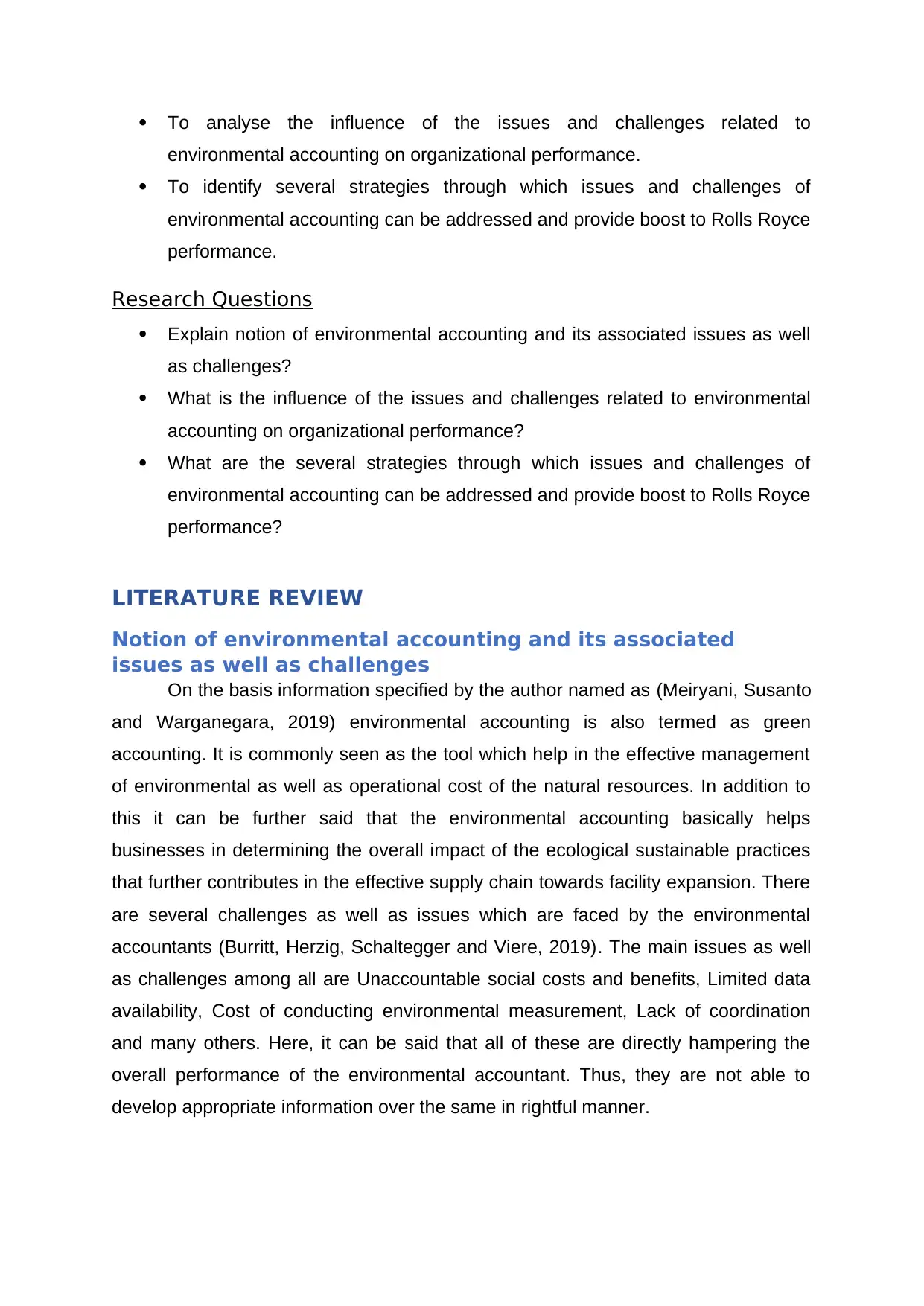
To analyse the influence of the issues and challenges related to
environmental accounting on organizational performance.
To identify several strategies through which issues and challenges of
environmental accounting can be addressed and provide boost to Rolls Royce
performance.
Research Questions
Explain notion of environmental accounting and its associated issues as well
as challenges?
What is the influence of the issues and challenges related to environmental
accounting on organizational performance?
What are the several strategies through which issues and challenges of
environmental accounting can be addressed and provide boost to Rolls Royce
performance?
LITERATURE REVIEW
Notion of environmental accounting and its associated
issues as well as challenges
On the basis information specified by the author named as (Meiryani, Susanto
and Warganegara, 2019) environmental accounting is also termed as green
accounting. It is commonly seen as the tool which help in the effective management
of environmental as well as operational cost of the natural resources. In addition to
this it can be further said that the environmental accounting basically helps
businesses in determining the overall impact of the ecological sustainable practices
that further contributes in the effective supply chain towards facility expansion. There
are several challenges as well as issues which are faced by the environmental
accountants (Burritt, Herzig, Schaltegger and Viere, 2019). The main issues as well
as challenges among all are Unaccountable social costs and benefits, Limited data
availability, Cost of conducting environmental measurement, Lack of coordination
and many others. Here, it can be said that all of these are directly hampering the
overall performance of the environmental accountant. Thus, they are not able to
develop appropriate information over the same in rightful manner.
environmental accounting on organizational performance.
To identify several strategies through which issues and challenges of
environmental accounting can be addressed and provide boost to Rolls Royce
performance.
Research Questions
Explain notion of environmental accounting and its associated issues as well
as challenges?
What is the influence of the issues and challenges related to environmental
accounting on organizational performance?
What are the several strategies through which issues and challenges of
environmental accounting can be addressed and provide boost to Rolls Royce
performance?
LITERATURE REVIEW
Notion of environmental accounting and its associated
issues as well as challenges
On the basis information specified by the author named as (Meiryani, Susanto
and Warganegara, 2019) environmental accounting is also termed as green
accounting. It is commonly seen as the tool which help in the effective management
of environmental as well as operational cost of the natural resources. In addition to
this it can be further said that the environmental accounting basically helps
businesses in determining the overall impact of the ecological sustainable practices
that further contributes in the effective supply chain towards facility expansion. There
are several challenges as well as issues which are faced by the environmental
accountants (Burritt, Herzig, Schaltegger and Viere, 2019). The main issues as well
as challenges among all are Unaccountable social costs and benefits, Limited data
availability, Cost of conducting environmental measurement, Lack of coordination
and many others. Here, it can be said that all of these are directly hampering the
overall performance of the environmental accountant. Thus, they are not able to
develop appropriate information over the same in rightful manner.
Secure Best Marks with AI Grader
Need help grading? Try our AI Grader for instant feedback on your assignments.
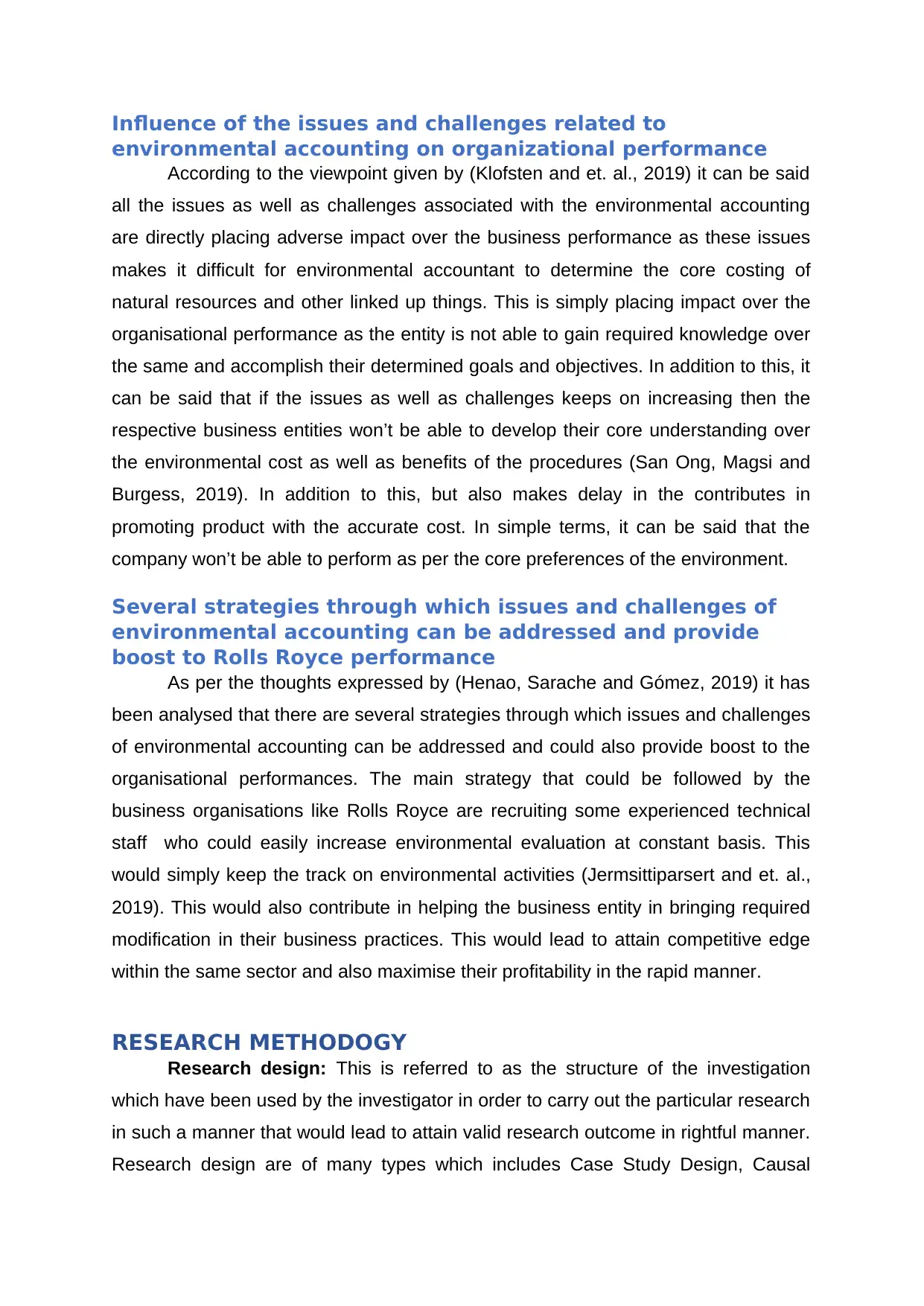
Influence of the issues and challenges related to
environmental accounting on organizational performance
According to the viewpoint given by (Klofsten and et. al., 2019) it can be said
all the issues as well as challenges associated with the environmental accounting
are directly placing adverse impact over the business performance as these issues
makes it difficult for environmental accountant to determine the core costing of
natural resources and other linked up things. This is simply placing impact over the
organisational performance as the entity is not able to gain required knowledge over
the same and accomplish their determined goals and objectives. In addition to this, it
can be said that if the issues as well as challenges keeps on increasing then the
respective business entities won’t be able to develop their core understanding over
the environmental cost as well as benefits of the procedures (San Ong, Magsi and
Burgess, 2019). In addition to this, but also makes delay in the contributes in
promoting product with the accurate cost. In simple terms, it can be said that the
company won’t be able to perform as per the core preferences of the environment.
Several strategies through which issues and challenges of
environmental accounting can be addressed and provide
boost to Rolls Royce performance
As per the thoughts expressed by (Henao, Sarache and Gómez, 2019) it has
been analysed that there are several strategies through which issues and challenges
of environmental accounting can be addressed and could also provide boost to the
organisational performances. The main strategy that could be followed by the
business organisations like Rolls Royce are recruiting some experienced technical
staff who could easily increase environmental evaluation at constant basis. This
would simply keep the track on environmental activities (Jermsittiparsert and et. al.,
2019). This would also contribute in helping the business entity in bringing required
modification in their business practices. This would lead to attain competitive edge
within the same sector and also maximise their profitability in the rapid manner.
RESEARCH METHODOGY
Research design: This is referred to as the structure of the investigation
which have been used by the investigator in order to carry out the particular research
in such a manner that would lead to attain valid research outcome in rightful manner.
Research design are of many types which includes Case Study Design, Causal
environmental accounting on organizational performance
According to the viewpoint given by (Klofsten and et. al., 2019) it can be said
all the issues as well as challenges associated with the environmental accounting
are directly placing adverse impact over the business performance as these issues
makes it difficult for environmental accountant to determine the core costing of
natural resources and other linked up things. This is simply placing impact over the
organisational performance as the entity is not able to gain required knowledge over
the same and accomplish their determined goals and objectives. In addition to this, it
can be said that if the issues as well as challenges keeps on increasing then the
respective business entities won’t be able to develop their core understanding over
the environmental cost as well as benefits of the procedures (San Ong, Magsi and
Burgess, 2019). In addition to this, but also makes delay in the contributes in
promoting product with the accurate cost. In simple terms, it can be said that the
company won’t be able to perform as per the core preferences of the environment.
Several strategies through which issues and challenges of
environmental accounting can be addressed and provide
boost to Rolls Royce performance
As per the thoughts expressed by (Henao, Sarache and Gómez, 2019) it has
been analysed that there are several strategies through which issues and challenges
of environmental accounting can be addressed and could also provide boost to the
organisational performances. The main strategy that could be followed by the
business organisations like Rolls Royce are recruiting some experienced technical
staff who could easily increase environmental evaluation at constant basis. This
would simply keep the track on environmental activities (Jermsittiparsert and et. al.,
2019). This would also contribute in helping the business entity in bringing required
modification in their business practices. This would lead to attain competitive edge
within the same sector and also maximise their profitability in the rapid manner.
RESEARCH METHODOGY
Research design: This is referred to as the structure of the investigation
which have been used by the investigator in order to carry out the particular research
in such a manner that would lead to attain valid research outcome in rightful manner.
Research design are of many types which includes Case Study Design, Causal
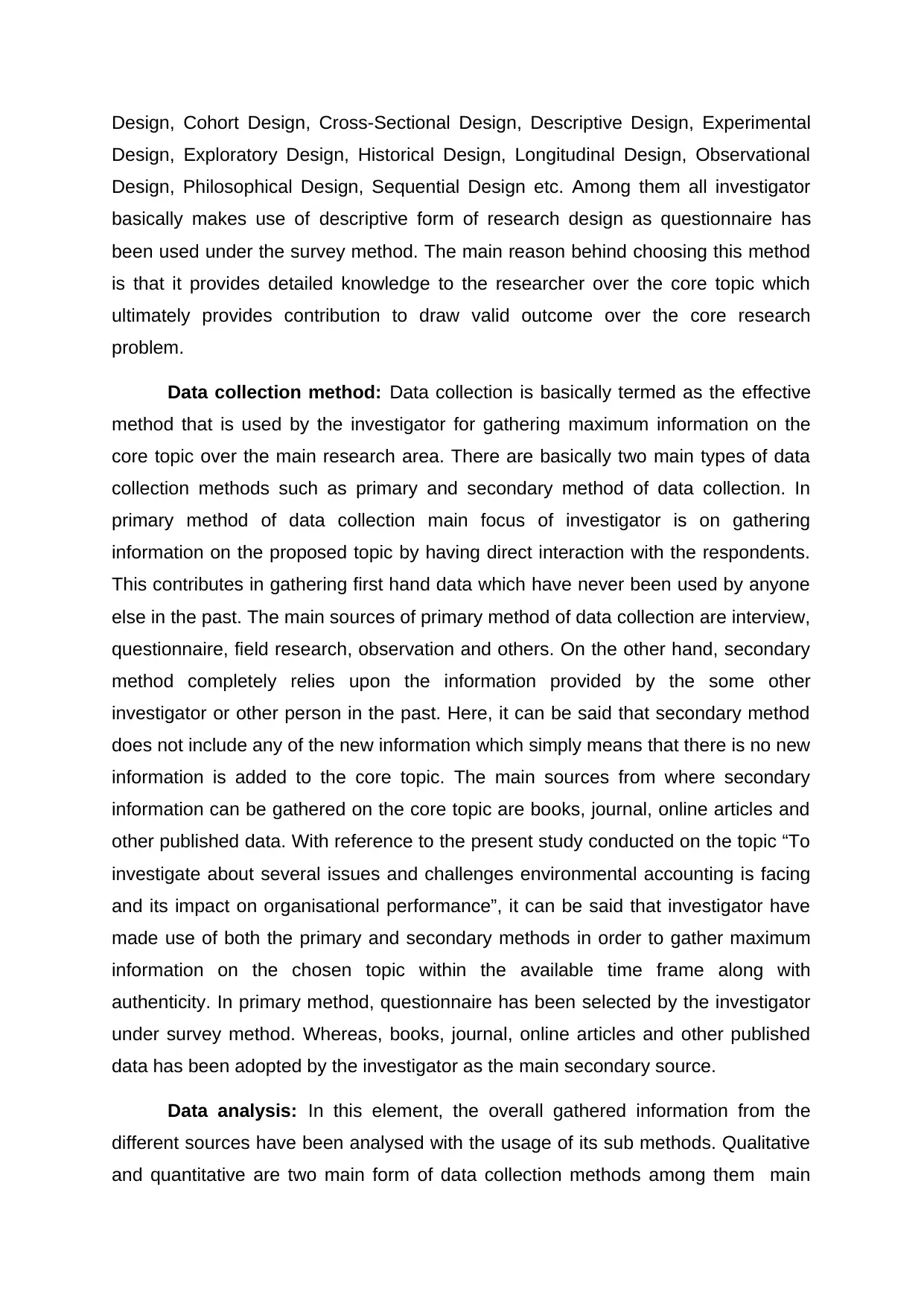
Design, Cohort Design, Cross-Sectional Design, Descriptive Design, Experimental
Design, Exploratory Design, Historical Design, Longitudinal Design, Observational
Design, Philosophical Design, Sequential Design etc. Among them all investigator
basically makes use of descriptive form of research design as questionnaire has
been used under the survey method. The main reason behind choosing this method
is that it provides detailed knowledge to the researcher over the core topic which
ultimately provides contribution to draw valid outcome over the core research
problem.
Data collection method: Data collection is basically termed as the effective
method that is used by the investigator for gathering maximum information on the
core topic over the main research area. There are basically two main types of data
collection methods such as primary and secondary method of data collection. In
primary method of data collection main focus of investigator is on gathering
information on the proposed topic by having direct interaction with the respondents.
This contributes in gathering first hand data which have never been used by anyone
else in the past. The main sources of primary method of data collection are interview,
questionnaire, field research, observation and others. On the other hand, secondary
method completely relies upon the information provided by the some other
investigator or other person in the past. Here, it can be said that secondary method
does not include any of the new information which simply means that there is no new
information is added to the core topic. The main sources from where secondary
information can be gathered on the core topic are books, journal, online articles and
other published data. With reference to the present study conducted on the topic “To
investigate about several issues and challenges environmental accounting is facing
and its impact on organisational performance”, it can be said that investigator have
made use of both the primary and secondary methods in order to gather maximum
information on the chosen topic within the available time frame along with
authenticity. In primary method, questionnaire has been selected by the investigator
under survey method. Whereas, books, journal, online articles and other published
data has been adopted by the investigator as the main secondary source.
Data analysis: In this element, the overall gathered information from the
different sources have been analysed with the usage of its sub methods. Qualitative
and quantitative are two main form of data collection methods among them main
Design, Exploratory Design, Historical Design, Longitudinal Design, Observational
Design, Philosophical Design, Sequential Design etc. Among them all investigator
basically makes use of descriptive form of research design as questionnaire has
been used under the survey method. The main reason behind choosing this method
is that it provides detailed knowledge to the researcher over the core topic which
ultimately provides contribution to draw valid outcome over the core research
problem.
Data collection method: Data collection is basically termed as the effective
method that is used by the investigator for gathering maximum information on the
core topic over the main research area. There are basically two main types of data
collection methods such as primary and secondary method of data collection. In
primary method of data collection main focus of investigator is on gathering
information on the proposed topic by having direct interaction with the respondents.
This contributes in gathering first hand data which have never been used by anyone
else in the past. The main sources of primary method of data collection are interview,
questionnaire, field research, observation and others. On the other hand, secondary
method completely relies upon the information provided by the some other
investigator or other person in the past. Here, it can be said that secondary method
does not include any of the new information which simply means that there is no new
information is added to the core topic. The main sources from where secondary
information can be gathered on the core topic are books, journal, online articles and
other published data. With reference to the present study conducted on the topic “To
investigate about several issues and challenges environmental accounting is facing
and its impact on organisational performance”, it can be said that investigator have
made use of both the primary and secondary methods in order to gather maximum
information on the chosen topic within the available time frame along with
authenticity. In primary method, questionnaire has been selected by the investigator
under survey method. Whereas, books, journal, online articles and other published
data has been adopted by the investigator as the main secondary source.
Data analysis: In this element, the overall gathered information from the
different sources have been analysed with the usage of its sub methods. Qualitative
and quantitative are two main form of data collection methods among them main
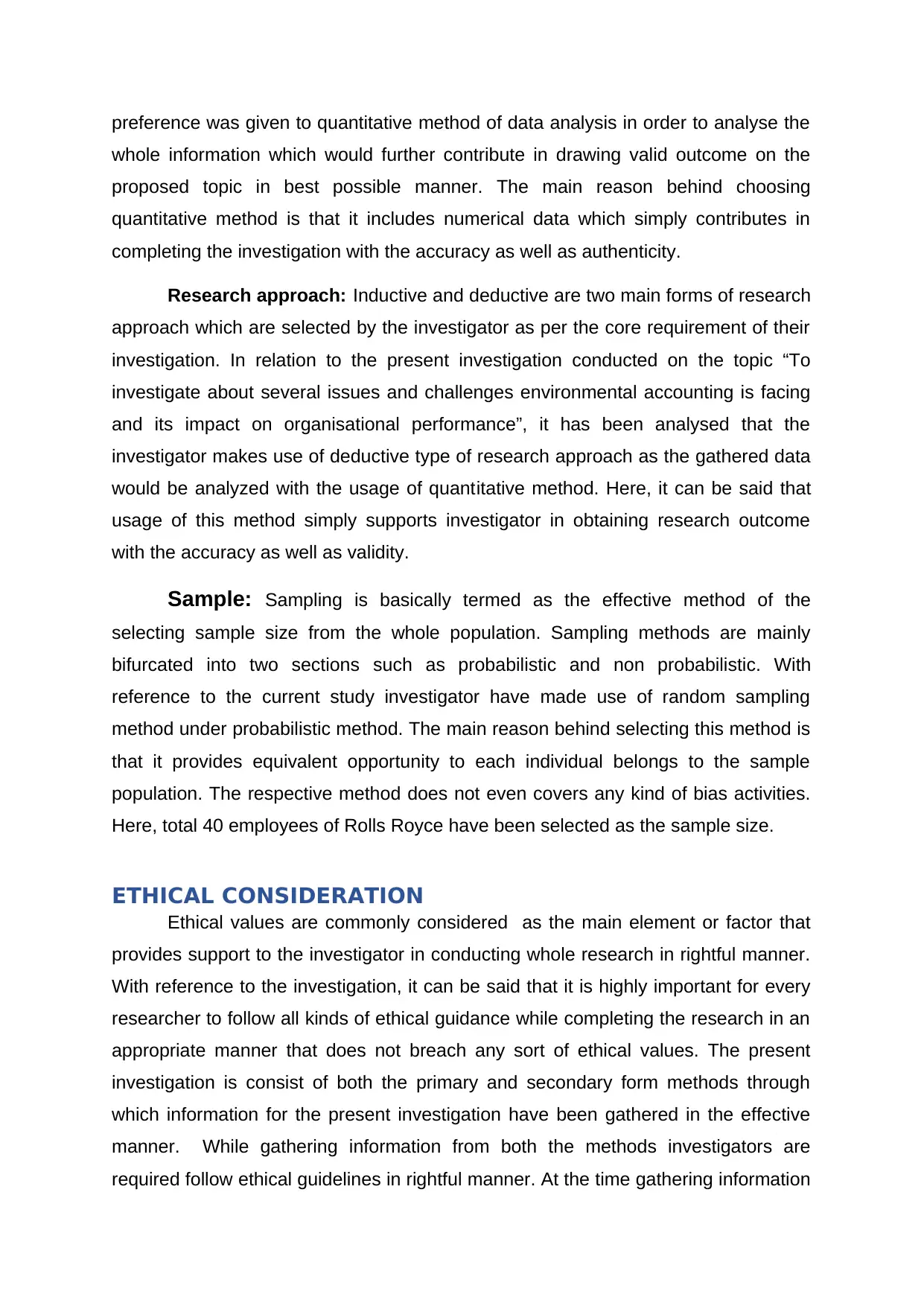
preference was given to quantitative method of data analysis in order to analyse the
whole information which would further contribute in drawing valid outcome on the
proposed topic in best possible manner. The main reason behind choosing
quantitative method is that it includes numerical data which simply contributes in
completing the investigation with the accuracy as well as authenticity.
Research approach: Inductive and deductive are two main forms of research
approach which are selected by the investigator as per the core requirement of their
investigation. In relation to the present investigation conducted on the topic “To
investigate about several issues and challenges environmental accounting is facing
and its impact on organisational performance”, it has been analysed that the
investigator makes use of deductive type of research approach as the gathered data
would be analyzed with the usage of quantitative method. Here, it can be said that
usage of this method simply supports investigator in obtaining research outcome
with the accuracy as well as validity.
Sample: Sampling is basically termed as the effective method of the
selecting sample size from the whole population. Sampling methods are mainly
bifurcated into two sections such as probabilistic and non probabilistic. With
reference to the current study investigator have made use of random sampling
method under probabilistic method. The main reason behind selecting this method is
that it provides equivalent opportunity to each individual belongs to the sample
population. The respective method does not even covers any kind of bias activities.
Here, total 40 employees of Rolls Royce have been selected as the sample size.
ETHICAL CONSIDERATION
Ethical values are commonly considered as the main element or factor that
provides support to the investigator in conducting whole research in rightful manner.
With reference to the investigation, it can be said that it is highly important for every
researcher to follow all kinds of ethical guidance while completing the research in an
appropriate manner that does not breach any sort of ethical values. The present
investigation is consist of both the primary and secondary form methods through
which information for the present investigation have been gathered in the effective
manner. While gathering information from both the methods investigators are
required follow ethical guidelines in rightful manner. At the time gathering information
whole information which would further contribute in drawing valid outcome on the
proposed topic in best possible manner. The main reason behind choosing
quantitative method is that it includes numerical data which simply contributes in
completing the investigation with the accuracy as well as authenticity.
Research approach: Inductive and deductive are two main forms of research
approach which are selected by the investigator as per the core requirement of their
investigation. In relation to the present investigation conducted on the topic “To
investigate about several issues and challenges environmental accounting is facing
and its impact on organisational performance”, it has been analysed that the
investigator makes use of deductive type of research approach as the gathered data
would be analyzed with the usage of quantitative method. Here, it can be said that
usage of this method simply supports investigator in obtaining research outcome
with the accuracy as well as validity.
Sample: Sampling is basically termed as the effective method of the
selecting sample size from the whole population. Sampling methods are mainly
bifurcated into two sections such as probabilistic and non probabilistic. With
reference to the current study investigator have made use of random sampling
method under probabilistic method. The main reason behind selecting this method is
that it provides equivalent opportunity to each individual belongs to the sample
population. The respective method does not even covers any kind of bias activities.
Here, total 40 employees of Rolls Royce have been selected as the sample size.
ETHICAL CONSIDERATION
Ethical values are commonly considered as the main element or factor that
provides support to the investigator in conducting whole research in rightful manner.
With reference to the investigation, it can be said that it is highly important for every
researcher to follow all kinds of ethical guidance while completing the research in an
appropriate manner that does not breach any sort of ethical values. The present
investigation is consist of both the primary and secondary form methods through
which information for the present investigation have been gathered in the effective
manner. While gathering information from both the methods investigators are
required follow ethical guidelines in rightful manner. At the time gathering information
Paraphrase This Document
Need a fresh take? Get an instant paraphrase of this document with our AI Paraphraser
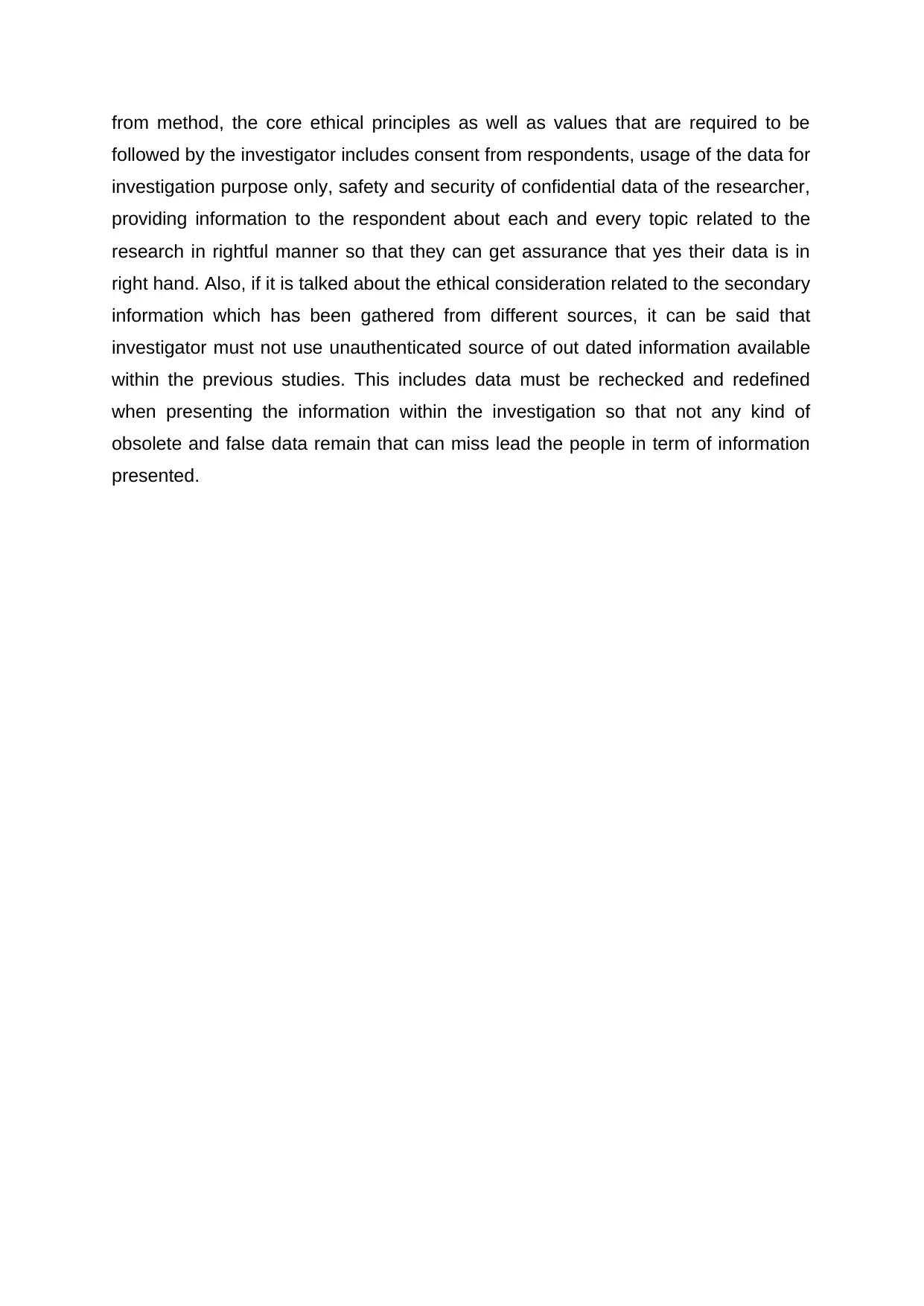
from method, the core ethical principles as well as values that are required to be
followed by the investigator includes consent from respondents, usage of the data for
investigation purpose only, safety and security of confidential data of the researcher,
providing information to the respondent about each and every topic related to the
research in rightful manner so that they can get assurance that yes their data is in
right hand. Also, if it is talked about the ethical consideration related to the secondary
information which has been gathered from different sources, it can be said that
investigator must not use unauthenticated source of out dated information available
within the previous studies. This includes data must be rechecked and redefined
when presenting the information within the investigation so that not any kind of
obsolete and false data remain that can miss lead the people in term of information
presented.
followed by the investigator includes consent from respondents, usage of the data for
investigation purpose only, safety and security of confidential data of the researcher,
providing information to the respondent about each and every topic related to the
research in rightful manner so that they can get assurance that yes their data is in
right hand. Also, if it is talked about the ethical consideration related to the secondary
information which has been gathered from different sources, it can be said that
investigator must not use unauthenticated source of out dated information available
within the previous studies. This includes data must be rechecked and redefined
when presenting the information within the investigation so that not any kind of
obsolete and false data remain that can miss lead the people in term of information
presented.
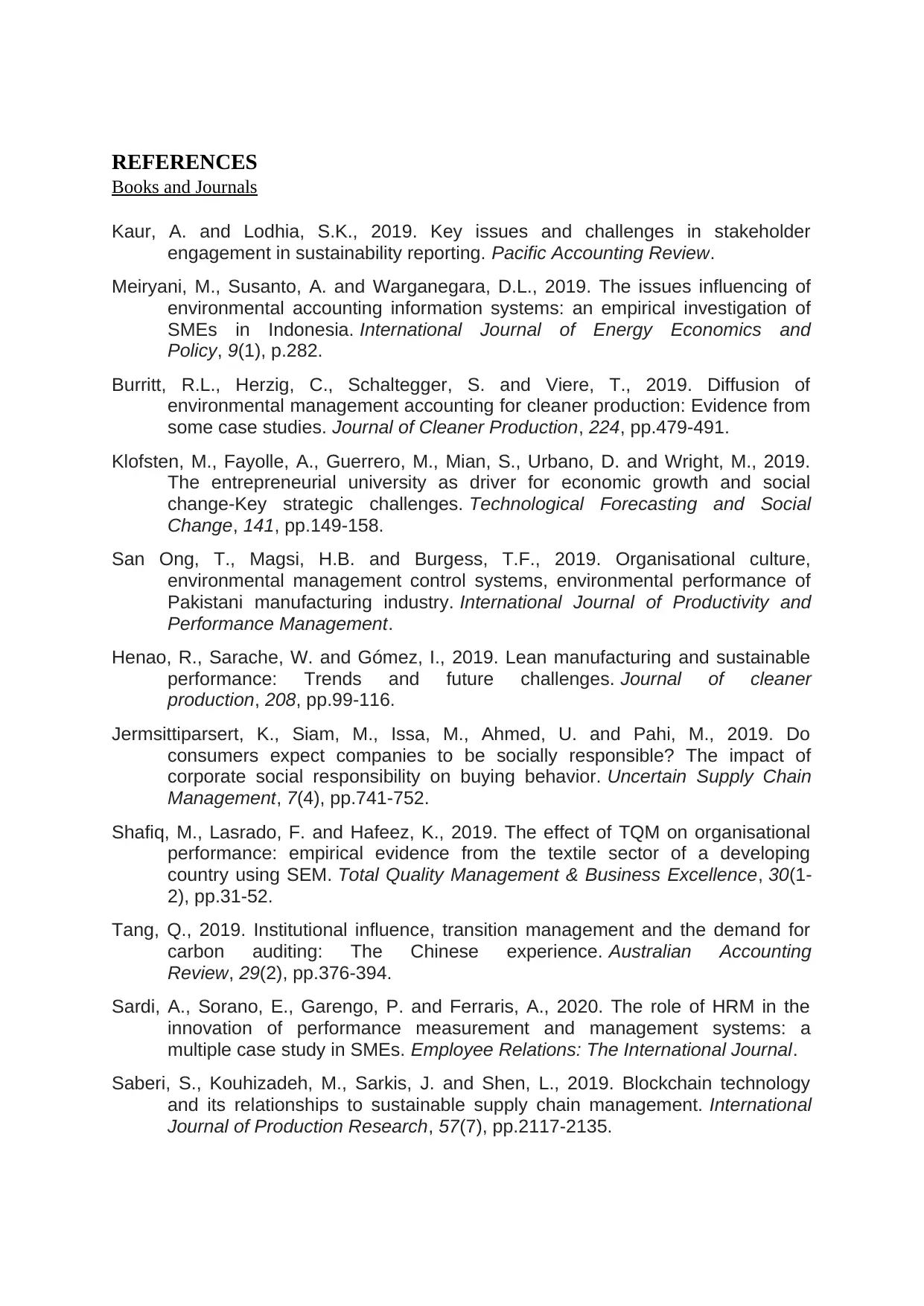
REFERENCES
Books and Journals
Kaur, A. and Lodhia, S.K., 2019. Key issues and challenges in stakeholder
engagement in sustainability reporting. Pacific Accounting Review.
Meiryani, M., Susanto, A. and Warganegara, D.L., 2019. The issues influencing of
environmental accounting information systems: an empirical investigation of
SMEs in Indonesia. International Journal of Energy Economics and
Policy, 9(1), p.282.
Burritt, R.L., Herzig, C., Schaltegger, S. and Viere, T., 2019. Diffusion of
environmental management accounting for cleaner production: Evidence from
some case studies. Journal of Cleaner Production, 224, pp.479-491.
Klofsten, M., Fayolle, A., Guerrero, M., Mian, S., Urbano, D. and Wright, M., 2019.
The entrepreneurial university as driver for economic growth and social
change-Key strategic challenges. Technological Forecasting and Social
Change, 141, pp.149-158.
San Ong, T., Magsi, H.B. and Burgess, T.F., 2019. Organisational culture,
environmental management control systems, environmental performance of
Pakistani manufacturing industry. International Journal of Productivity and
Performance Management.
Henao, R., Sarache, W. and Gómez, I., 2019. Lean manufacturing and sustainable
performance: Trends and future challenges. Journal of cleaner
production, 208, pp.99-116.
Jermsittiparsert, K., Siam, M., Issa, M., Ahmed, U. and Pahi, M., 2019. Do
consumers expect companies to be socially responsible? The impact of
corporate social responsibility on buying behavior. Uncertain Supply Chain
Management, 7(4), pp.741-752.
Shafiq, M., Lasrado, F. and Hafeez, K., 2019. The effect of TQM on organisational
performance: empirical evidence from the textile sector of a developing
country using SEM. Total Quality Management & Business Excellence, 30(1-
2), pp.31-52.
Tang, Q., 2019. Institutional influence, transition management and the demand for
carbon auditing: The Chinese experience. Australian Accounting
Review, 29(2), pp.376-394.
Sardi, A., Sorano, E., Garengo, P. and Ferraris, A., 2020. The role of HRM in the
innovation of performance measurement and management systems: a
multiple case study in SMEs. Employee Relations: The International Journal.
Saberi, S., Kouhizadeh, M., Sarkis, J. and Shen, L., 2019. Blockchain technology
and its relationships to sustainable supply chain management. International
Journal of Production Research, 57(7), pp.2117-2135.
Books and Journals
Kaur, A. and Lodhia, S.K., 2019. Key issues and challenges in stakeholder
engagement in sustainability reporting. Pacific Accounting Review.
Meiryani, M., Susanto, A. and Warganegara, D.L., 2019. The issues influencing of
environmental accounting information systems: an empirical investigation of
SMEs in Indonesia. International Journal of Energy Economics and
Policy, 9(1), p.282.
Burritt, R.L., Herzig, C., Schaltegger, S. and Viere, T., 2019. Diffusion of
environmental management accounting for cleaner production: Evidence from
some case studies. Journal of Cleaner Production, 224, pp.479-491.
Klofsten, M., Fayolle, A., Guerrero, M., Mian, S., Urbano, D. and Wright, M., 2019.
The entrepreneurial university as driver for economic growth and social
change-Key strategic challenges. Technological Forecasting and Social
Change, 141, pp.149-158.
San Ong, T., Magsi, H.B. and Burgess, T.F., 2019. Organisational culture,
environmental management control systems, environmental performance of
Pakistani manufacturing industry. International Journal of Productivity and
Performance Management.
Henao, R., Sarache, W. and Gómez, I., 2019. Lean manufacturing and sustainable
performance: Trends and future challenges. Journal of cleaner
production, 208, pp.99-116.
Jermsittiparsert, K., Siam, M., Issa, M., Ahmed, U. and Pahi, M., 2019. Do
consumers expect companies to be socially responsible? The impact of
corporate social responsibility on buying behavior. Uncertain Supply Chain
Management, 7(4), pp.741-752.
Shafiq, M., Lasrado, F. and Hafeez, K., 2019. The effect of TQM on organisational
performance: empirical evidence from the textile sector of a developing
country using SEM. Total Quality Management & Business Excellence, 30(1-
2), pp.31-52.
Tang, Q., 2019. Institutional influence, transition management and the demand for
carbon auditing: The Chinese experience. Australian Accounting
Review, 29(2), pp.376-394.
Sardi, A., Sorano, E., Garengo, P. and Ferraris, A., 2020. The role of HRM in the
innovation of performance measurement and management systems: a
multiple case study in SMEs. Employee Relations: The International Journal.
Saberi, S., Kouhizadeh, M., Sarkis, J. and Shen, L., 2019. Blockchain technology
and its relationships to sustainable supply chain management. International
Journal of Production Research, 57(7), pp.2117-2135.

1 out of 10
Related Documents
Your All-in-One AI-Powered Toolkit for Academic Success.
+13062052269
info@desklib.com
Available 24*7 on WhatsApp / Email
![[object Object]](/_next/static/media/star-bottom.7253800d.svg)
Unlock your academic potential
© 2024 | Zucol Services PVT LTD | All rights reserved.





